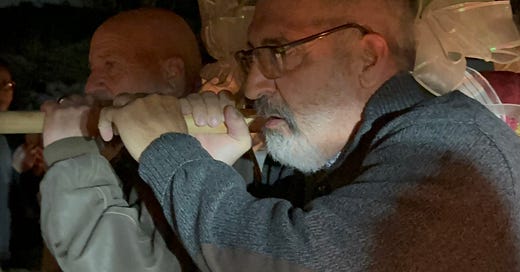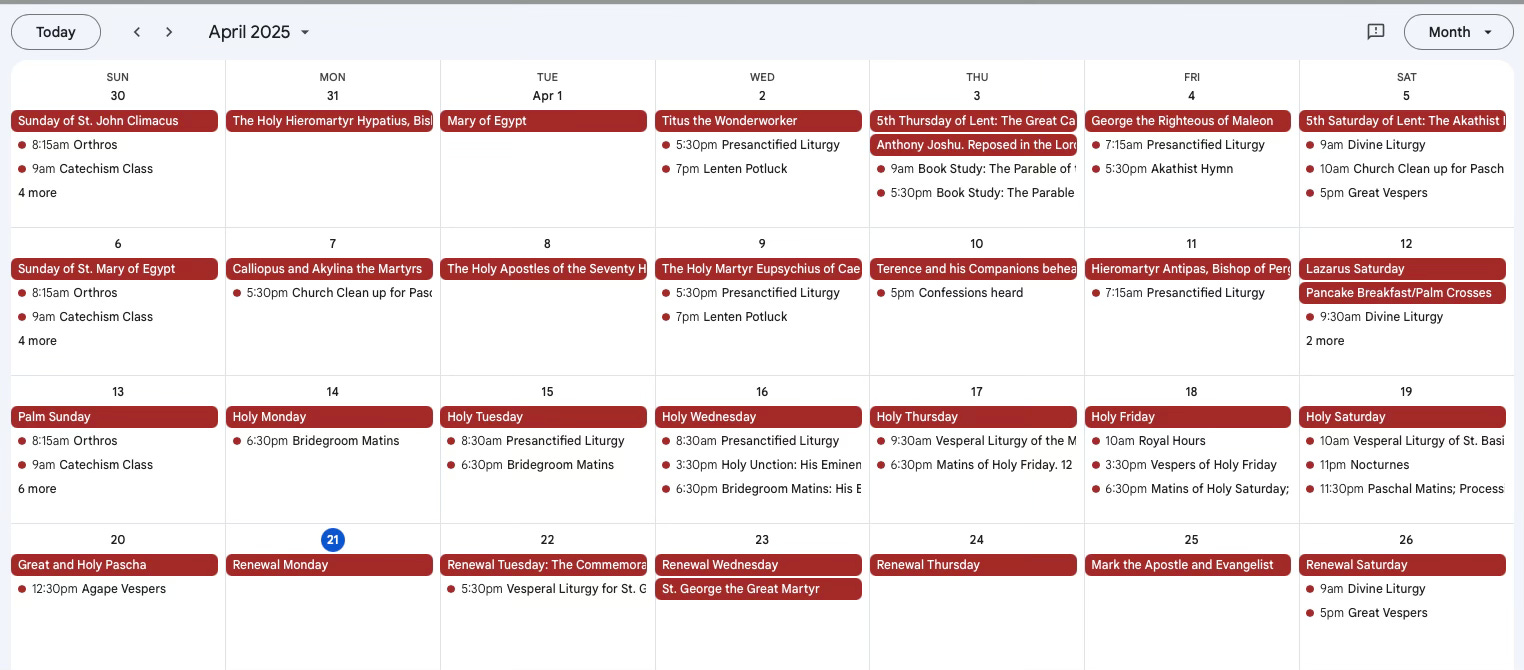What Celebrating the Death, Burial, and Resurrection of Christ Does in My Heart
There is a reason why the Church focuses so much attention on this time in the liturgical calendar.
Easter, or Pascha as it is called in my husband’s Greek Orthodox church, is ending. Easter Monday is not even a holiday for us here in the US. Ironically, it still is in my home country of Germany, even with all the secularization there.
I’ll be honest. I am exhausted. I haven’t slept much this past week. But I am ecstatic and exceedingly happy because of the week that just passed! God worked overtime in my heart this week, as I pondered His goodness and mercy towards me, a dreadful and weak sinner!
In our marriage, we juggle two churches: my Syriac Orthodox St. Mary down in Glendale, AZ, which is just over 1:30 hours drive from us, and Nick’s Greek Orthodox St. George, twelve minutes from our home here in Prescott in northern Arizona.
I spent almost the entire time with Nick this Holy Week at his church. I try to go to St. Mary every Sunday as much as possible. I went for Palm Sunday and the Naheereh Service. However, during Holy Week, the services are at 7:30 pm, starting on Maundy Thursday with Holy Qurobo, followed by the Foot Washing prayers. This makes it hard for me to get to Phoenix. I wouldn’t be home before 11 or 11:30 pm. So, as a couple, we decided to go for Maundy Thursday services, but then spend the rest of Holy Week up here in Prescott.
And what a week it was. Actually, what a Lent followed by Holy Week it was! Here is a little insight into all the different times Nick and I were in church. We try to make it every time the door is open. So if you count it up, we were there probably 25 times or so in the last three weeks, including for church clean-up. Glory to God for giving us (and our priest) the strength!
In contrast, this was Holy Week at St. Mary’s Syriac Orthodox Church - because we don’t own a building yet, we were meeting at night at a Coptic church - so by default, putting a limit on what we can do.
So, all this is set up to explain why what follows will be heavily influenced by the Greek Orthodox Pascha experience and not outweighed by the Syriac Orthodox.
With the Palm Sunday Holy Qurobo, after which I experienced the Naheereh service for the first time in the late afternoon, I was ready for Holy Week. The procession with the adoration of the Word of God and the Cross certainly set the tone for what matters to faithful believers.
The first three days of Holy Week in the Greek Orthodox Church are celebrated with the so-called Bridegroom Matins at night. These prayers announce the coming of the Lord, who is described as the Bridegroom of His Church.

Each evening has a theme. Tuesday was the sinful woman who poured out expensive perfume on the Lord. Just reading the hymnody makes me want to completely lose it as I remember my sinfulness before the Lord and how much mercy He has shown me repeatedly! (Forgive the dark photos - it was a bit dark!)

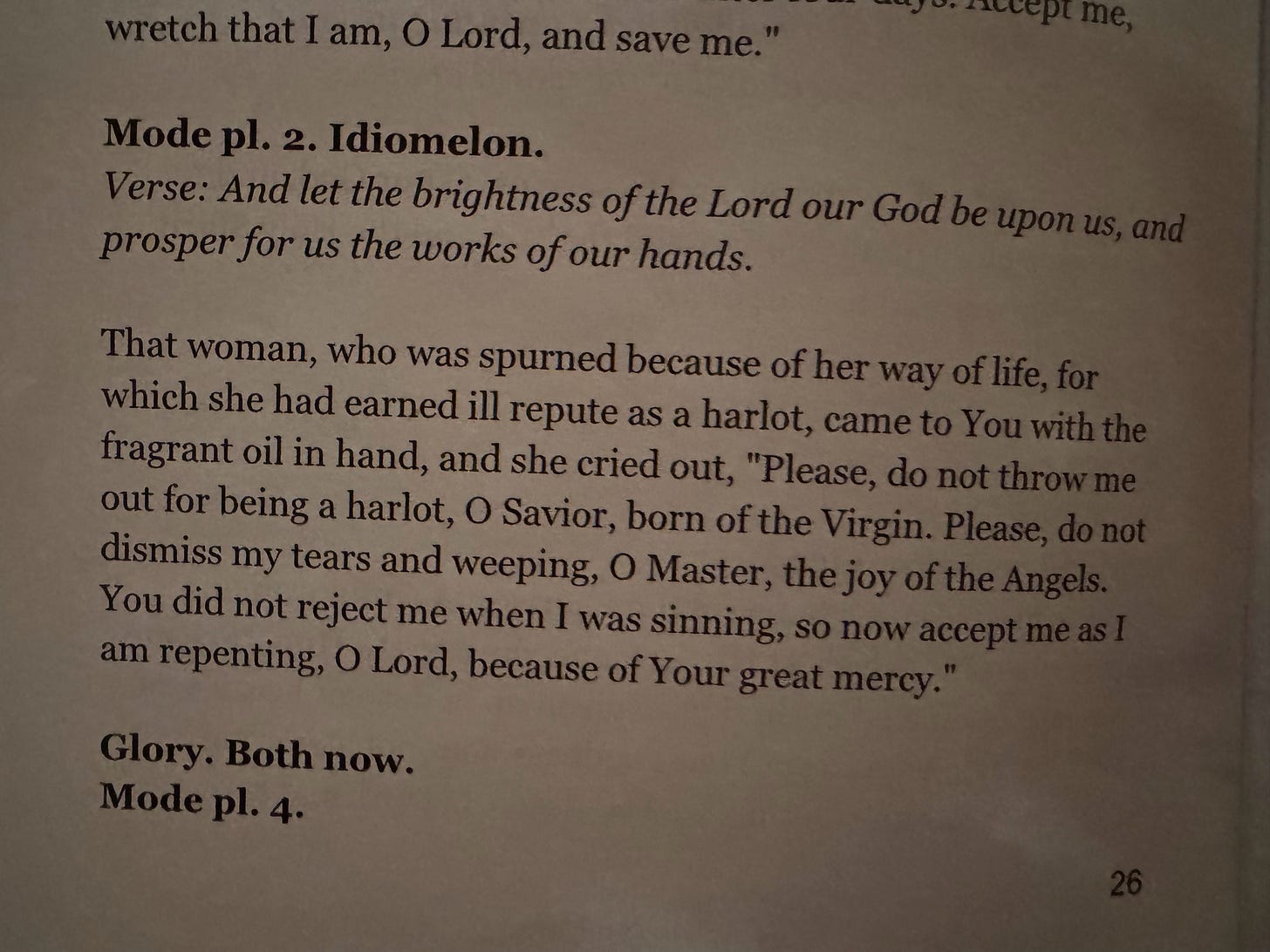
I was especially blessed by the fact that my husband Nick was at the chant stand for the Bridegroom Matins and was asked to read some of the Psalms and responses and help with the chanting. Although this parish has about 150 faithful total on a Sunday, many times some help is needed to chant and read mid-week when many are at work.
Wednesday started with a Presanctified Gifts liturgy, which has disappeared from both the Syriac Orthodox and the Coptic Orthodox Churches - or maybe was never truly practiced in public settings. Coptic priest Father Peter Farrington describes it as such: “A Presanctified Liturgy is one in which a chalice of wine is consecrated by a portion of the holy Body of the Lord which has been preserved from a Liturgy taking place on another and earlier date.”1 He translated from the French a single manuscript describing such a liturgy, and it is ascribed to St. Severus of Antioch. (You can find the English translation at the link posted in the footnote below.) My spiritual father told me that such a tradition existed in the Coptic Orthodox Church, but it fell out of favor. I haven’t done a great deal of research on this, so if you know more, please comment!
At any rate, the Greek Orthodox do not celebrate a full Divine Liturgy midweek during Lent, and so the Presanctified Gifts liturgy takes the place for the faithful to partake of the Eucharist. During it, a beautiful hymn (all in minor key) is sung while the Eucharist is being brought from the side table in the altar to the altar itself: "Now the Powers of heaven invisibly serve with us. Lo, the King of glory enters. Lo, the mystical sacrifice is upborne, fulfilled. Let us draw near with faith and love and become communicants of life eternal.” It is truly mind-bogglingly beautiful when the priest carries the gifts with covered head to the altar - and all kneel in reverence. I have to admit, I miss that in my Syriac Orthodox Church. It seems so much more worshipful and reverential to the Lord Jesus Christ as His body and blood are carried to the altar. The Greeks kneel a lot!
And this time, I was asked to help out at the chant stand reading Psalms and Scripture and chanting. You could say Holy Week was firmly supported by the Speliopoulos family this year! I have to admit this is one thing I absolutely miss in my own Syriac Orthodox setting. I am not ordained as a deaconess (Mzamronyotho). But trust me, I sing from the pews a bit further back as much as I can. 🙃
Wednesday brought another major day in the Holy Week in the Greek Orthodox world: the Sacrament of Holy Unction. Unlike in the Syriac Orthodox Church where I have only seen it when someone was very sick, and then only for that person in a church setting, in the Greek Orthodox Church, this sacrament is given to all the faithful, not just for the healing of sickness, but also for the forgiveness of sin, and this right before Pascha (as the Greek Orthodox call Easter). This past week, it was even more special as His Eminence Metropolitan Gerasimos of San Francisco came to celebrate this sacrament and the following Bridegroom Matins in the evening with us. Here is me receiving the sacrament from him.
Thursday began with a Vesperal Liturgy in the morning at St. George, and then Nick and I drove down to worship (finally!) with my St. Mary’s brethren. I had been to a Maundy Thursday/Footwashing before, but Nick hadn’t, so I was happy to introduce him to this Syriac Orthodox tradition.
After a short night (we got home at 11:30 pm), Holy Friday was upon us. Another big day! Royal Hours from 10-12, where the Gospel was read to the Emperor. Then, the Vespers of Holy Friday, where Jesus is taken off the cross and wrapped in a burial shroud with the children's help. And finally, the Matins of Holy Saturday includes a procession with the Epitaphios, the procession of a specially embroidered cloth icon carried together with the Gospel book in a beautifully decorated wooden “tomb.” The icon represents the burial of Jesus Christ, and the procession is a solemn commemoration of his death and burial.
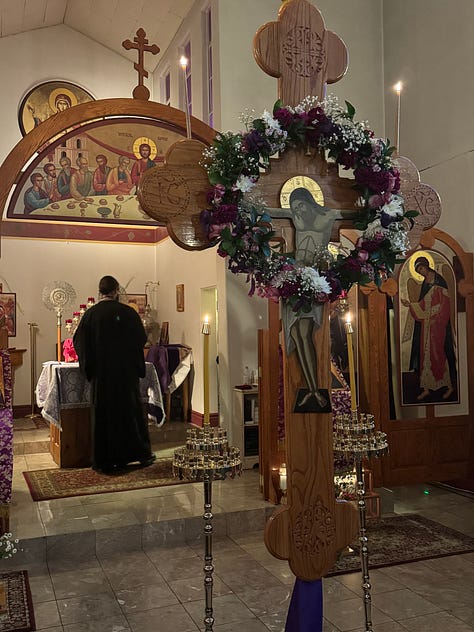



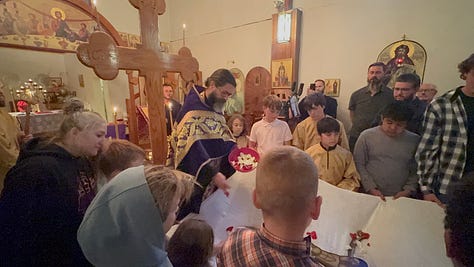
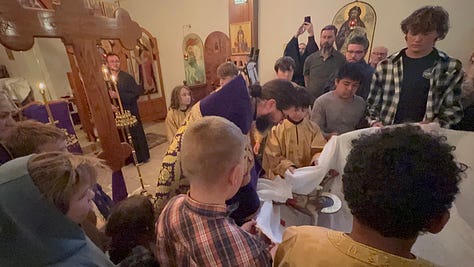

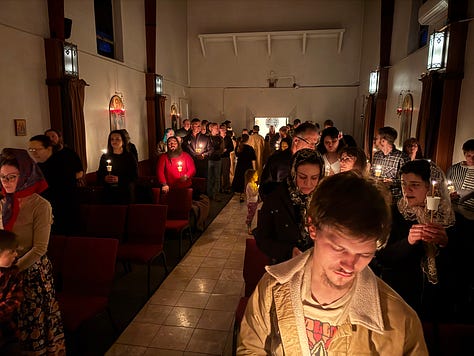
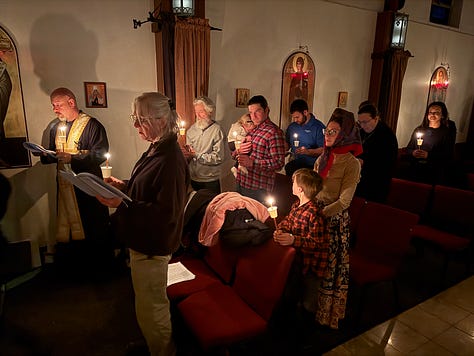
It was a very special night for my husband who was one of four men chosen to carry the Epitaphios. Once back at the church, the faithful walk under it and kiss the Gospel book.
We still had Holy Saturday and Resurrection Sunday to come, and my heart was so full already from all the beautiful hymnody and prayers! Thank God, I have a German translation of our Syriac Orthodox prayers, which helps greatly in following along. Of course, in Nick’s church, everything is in English, and I found myself crying many times over my own sinfulness and the goodness of Christ conquering death by His own death.
For today, let’s end here. I will wrap up the most important days in another post. Let me just conclude by saying, I am thankful to God for allowing me to worship in both Eastern and Oriental Orthodox settings. I pray daily for the unity of our churches to truly represent the ONE HOLY, CATHOLIC, and APOSTOLIC Church. We have so much to learn from each other to worship our Lord in ever more meaningful ways. Please pray with me!

